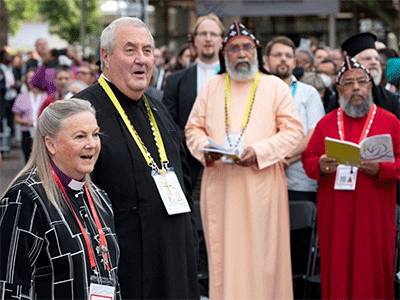The World Council of Churches 11th Assembly took place from Aug. 31-Sept. 8. In connection with the theme of the ecumenical gathering — “Christ’s Love Moves the World to Reconciliation and Unity” — Bishop Ivan Abrahams made reconciliation the centerpiece of his sermon.
During this weekend the Assembly was expressly intended for excursions and congregational encounters. The participants and contributors traveling from around the world were given the opportunity to get to know the respective life of the churches of the host city and country.
The World Council of Churches is an ecumenical partner supported by the Interdenominational Cooperation Fund apportionment, which enables United Methodists to share a presence and a voice in the activities of several national and worldwide ecumenical organizations.
In that spirit, Methodist guests visited Karlsruhe United Methodist Church in September.
For the United Methodist Church of the Redeemer in Reutlingen, that Sunday was all about international Methodist encounters. Both the morning church service and an evening reception brought together Methodists from four continents, German churchgoers and guests from other United Methodist congregations who came just for that day.

Sauca join in singing during the opening prayer service for the World
Council of Churches' 11th Assembly in Karlsruhe, Germany, Aug. 31.
The assembly took place Aug. 31-Sept. 8 under the theme "Christ's Love
Moves the World to Reconciliation and Unity." Photo by Mike DuBose, UM News.
Abrahams, the General Secretary of the World Methodist Council and bishop of the Methodist Church in Southern Africa, encouraged the churchgoers to undertake every effort to heal relationships by offering forgiveness and pardon. This is a biblical command, Abrahams stated.
He also referred to Karl Barth, who attributed a central importance to the topic of reconciliation in his extensive theological works. Reconciliation, according to Barth, is not negotiable, but rather stands as a command of the highest order. Abrahams summarized this command: “We are ambassadors of reconciliation.” Therefore, it is about more than just personal well-being. The goal of reconciliation is to renew and transform society and the world.
Christians should not, however, passively wait for better times. Rather, they must orient themselves with the almost humorous-sounding sentence that the U.S. writer and activist June Jordan (1936-2002) formulated: “We are the ones we have been waiting for.” Abrahams stressed that again: “We are the ones to bring about change.”
Methodists have always been excellent at displaying this attitude, Abrahams said. They have had an untamable spirit and could always strike up a song, even in the face of hopeless situations.
At the evening reception, for which many of the international Methodist guests returned to the Church of the Redeemer, Bishop Harald Rückert took up the thoughts of the morning sermon. The United Methodist bishop who oversees the Germany Central Conference combined his greetings and a short report on the situation of church and Methodist work in Germany with the special geographic location of the city of Karlsruhe.
This change can serve as an impressive example of what reconciliation can achieve. Rückert expressly connected that with the situation in which The United Methodist Church finds itself. The worldwide discussion within the church over questions of sexual ethics is tearing the church apart.
The example of the region of Karlsruhe, where two deeply hostile nations once faced each other, can offer encouragement, Rückert said. Today, there is no longer even a visible border between the formerly hostile nations. The example underlines the biblical truth: “Reconciliation is possible.”
With these substantive messages, Methodist guests encountered one another morning and afternoon and made new contacts or deepened existing ones. The General Assembly of the World Council of Churches thus served as impetus for “worldwide Methodist ecumenism.”
excerpt from a story by Klaus Ulrich Ruof, public relations officer and spokesperson for The United Methodist Church in Germany
One of seven apportioned giving opportunities of The United Methodist Church, the Interdenominational Cooperation Fund enables United Methodists to share a presence and a voice in the activities of several national and worldwide ecumenical organizations. Please encourage your leaders and congregations to support the Interdenominational Cooperation Fund apportionment at 100 percent.





